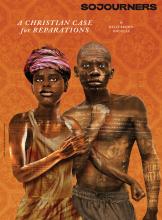AS ISRAELI PRIME Minister Benjamin Netanyahu prepared this spring to annex significant chunks of the West Bank and further tighten control over Palestinians, with the acquiescence of erstwhile rival Benny Gantz, the blueprint and rationale for his actions has been clear: Donald Trump’s so-called “peace” plan. Since the announcement of the U.S. plan in late January, some have explained why it is harmful to even the most basic requirements for peace—but few have analyzed how the Trump plan dealt with Palestinian Christians.
The architects behind the so-called “Peace to Prosperity” plan prefer the nonexistence of Palestinian Christians. These authors share an ideological bias that is troubled by the fact that Christians are an integral part of the Palestinian people.
The plan mentions Jews and Christians on one side and Muslims on the other, as if to communicate that this is a religious conflict between the Judeo-Christian tradition and Islam. While this may serve the partisan domestic purposes of Mr. Trump and Mr. Netanyahu, this is not our lived reality as Palestinian Christians.
Read the Full Article

